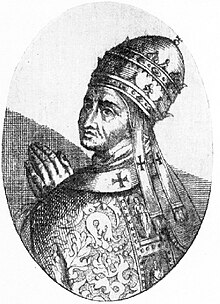Nicolo Bocassini
|
Blessed Pope Benedict XI |
|
|---|---|
 |
|
| Papacy began | 22 October 1303 |
| Papacy ended | 7 July 1304 |
| Predecessor | Boniface VIII |
| Successor | Clement V |
| Orders | |
| Ordination | 1300 |
| Consecration | March 1300 |
| Created Cardinal | 4 December 1298 by Boniface VIII |
| Personal details | |
| Birth name | Nicola Boccasini |
| Born | 1240 Treviso, Italy, Holy Roman Empire |
| Died | 7 July 1304 (aged 64) Perugia, Papal States |
| Previous post |
|
| Motto | Illustra faciem Tuam super servum Tuum ("Let Your Face shine upon Your servant") |
| Coat of arms |  |
| Sainthood | |
| Feast day | 7 July |
| Beatified | 24 April 1736 Rome, Papal States by Pope Clement XII |
| Attributes |
|
| Patronage | Treviso |
|
Papal styles of Pope Benedict XI |
|
|---|---|
 |
Pope Benedict XI (Latin: Benedictus XI; 1240 – 7 July 1304), born Nicola Boccasini, (Niccolò of Treviso) was Pope from 22 October 1303 to his death on 7 July, 1304. He was also a member of the Order of Preachers.
He was beatified with his cultus confirmed by Pope Clement XII in 1736. He is a patron of Treviso.
Niccolò Boccasini was born in Treviso to Boccasio, a municipal notary (died 1246), whose brother was a priest; and Ber(n)arda, who worked as a laundress for the Dominican friars of Treviso. Niccolò had a sister, Adelette. The family lived outside the walls of Treviso, in a suburb called S. Bartolommeo. In 1246, a Dominican friar left a sum of money in his will to Bernarda and her children, recently orphaned. A condition was that if Niccolò were to enter the Dominican Order he would receive half of the entire legacy. From the age of six, it seems, Niccolò was destined for the monkish life. His first teacher was his uncle, the priest of S. Andrea.
He entered the Order of Preachers in 1254, at the age of fourteen, taking the habit of a novice in his native Treviso. He was taken to Venice by his Prior and presented to the Provincial, who assigned him to the convent of SS. Giovanni e Paolo in Venice. For the next seven years or so, Niccolò pursued his basic education in Venice. Toward the end of this period, he served as tutor to the young sons of Romeo Quirini of Venice, whose brother was a Canon in the Cathedral of Treviso. In 1262, Niccolò was transferred to Milan, to the new studium of S. Eustorgio. He spent the next six years at S. Eustorgio. By the end of his term at S. Eustorgio he must have become a professed member of the Order of Preachers; the actual date, however, is unknown. As a professed brother he served in the responsible position as a Lecturer in the studium in Venice, that is to say, he was in charge of the elementary education of the brothers in his convent. Each convent had its lector. He served as lector for fourteen years, from 1268 to 1282, according to Bernardus Guidonis. In 1276 he is attested as being lector at the Dominican convent in his native Treviso, a post he was still holding in 1280. In February, 1282, he is found at Genoa, again as lector. He was not a professor, since he had never taken a university degree.
In 1286, at the meeting of the Provincial Chapter, which took place that year in Brescia, Fr. Niccolò was elected Provincial Prior of Lombardy. As Provincial of Lombardy, Fr. Niccolò's lifestyle changed considerably. Instead of being firmly attached to a single convent for years, he would instead become peripatetic, moving from one convent to another on visits of inspection, encouragement and correction. In Lombardy at the time there were some fifty-one convents. He also had responsibility as an Inquisitor, a task for which popes considered Franciscans and Dominicans especially suited. He also had the responsibility of convening the Provincial Chapters. In 1287, the Chapter was at Venice; in 1288, it was at Rimini; in 1289 at the General Chapter, which was held at Trier, Fr. Niccolò was released from the office of Provincial of Lombardy, having completed his three-year term. It is probable that, without office, he returned to a convent, possibly that of Treviso—though the evidence is scanty and based on wills and codicils. He was elected Provincial Prior of Lombardy again, however, at the Provincial Chapter held at Brescia in 1293. In 1294 it was held at Faventia, in 1295 at Verona, and in 1296 at Ferrara, where Fr. Niccolò's successor was elected, since he had a new assignment.
...
Wikipedia
